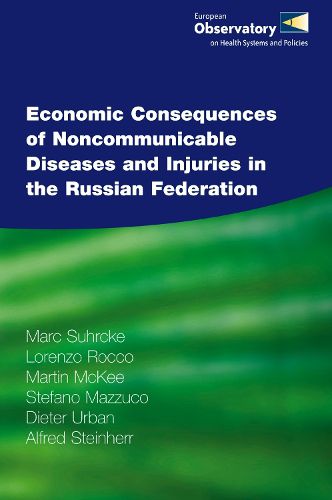Readings Newsletter
Become a Readings Member to make your shopping experience even easier.
Sign in or sign up for free!
You’re not far away from qualifying for FREE standard shipping within Australia
You’ve qualified for FREE standard shipping within Australia
The cart is loading…






There is increasing evidence of the two-way relationship between health and economic growth: while economic development can lead to improved population health, a healthier population can also drive economic growth. Although this finding has important policy implications, little is known about its direct relevance for the transition countries in central and eastern Europe and the Commonwealth of Independent States that are facing a very particular health challenge, predominantly posed by noncommunicable diseases (NCD) and injuries.
This study takes a first step towards analyzing the issue. The focus is on the Russian Federation, although the findings are also relevant to other transitional economies. Two important questions are examined:
- What effect has adult ill-health, in particular NCD and injuries, had on the Russian economy and the economic outcomes of the people living there? - If the excessive burden of adult ill-health in the Russian Federation were reduced, what economic benefits could result?
The answers are unambiguous: poor adult health negatively affects economic wellbeing at both the individual and household levels in the Russian Federation; and, if effective action were taken, improved health would play an important role in sustaining high economic growth rates.
$9.00 standard shipping within Australia
FREE standard shipping within Australia for orders over $100.00
Express & International shipping calculated at checkout
Stock availability can be subject to change without notice. We recommend calling the shop or contacting our online team to check availability of low stock items. Please see our Shopping Online page for more details.
There is increasing evidence of the two-way relationship between health and economic growth: while economic development can lead to improved population health, a healthier population can also drive economic growth. Although this finding has important policy implications, little is known about its direct relevance for the transition countries in central and eastern Europe and the Commonwealth of Independent States that are facing a very particular health challenge, predominantly posed by noncommunicable diseases (NCD) and injuries.
This study takes a first step towards analyzing the issue. The focus is on the Russian Federation, although the findings are also relevant to other transitional economies. Two important questions are examined:
- What effect has adult ill-health, in particular NCD and injuries, had on the Russian economy and the economic outcomes of the people living there? - If the excessive burden of adult ill-health in the Russian Federation were reduced, what economic benefits could result?
The answers are unambiguous: poor adult health negatively affects economic wellbeing at both the individual and household levels in the Russian Federation; and, if effective action were taken, improved health would play an important role in sustaining high economic growth rates.